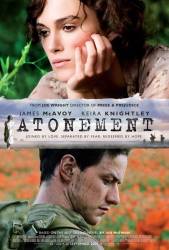Continuity mistake: When Cecilia and Robbie are having sex against the bookcase, a close-up reveals she slips her left foot out of her shoe. But when Briony walks into the room and the two lovers are shown motionless, we see Cecilia still has both shoes on. (00:36:30)
Continuity mistake: When Briony sees Cecilia coming out of the fountain (from Briony's perspective), Cecilia steps out of the water with her right foot first. When we see the same scene afterwards, from Cecilia an Robbie's perspective, Cecilia steps with her left foot first.
Continuity mistake: In the love making scene in the library, Robbie pulls down the strap of Cecilia's dress and she pulls her arm out. In the next shot it is up and over her shoulder again.
Continuity mistake: When Briony walks in on Robbie and Celia in the library, the door is slightly ajar (since it's the lamp in the room that catches her attention). But when the scene is replayed from Robbie and Celia's perspective, Robbie shuts the door completely.
Continuity mistake: In the scene by the fountain from Briony's point of view, when Cecilia takes her top off she pulls the strap of her undergarment twice. However, from Robbie's point of view, she doesn't pull the straps at all.
Continuity mistake: In the first enactment of the fountain scene from Briony's viewpoint, the twins have just left her room and can be heard yelling downstairs for Celia's permission to go swimming. In an immediate, steady shot she goes to the window and witnesses the fountain scene already midway through. As we see in the next scene, from Celia's perspective, the twins run by asking to go swimming and she lingers in the piano room for several minutes and takes even a few more minutes chatting and walking with Robbie before they even begin the fountain scene.






Chosen answer: Not as such. The only systematic massacre of civilians in the Dunkirk campaign was in the Flemish village of Vingkt, where the German 377th Infantry Regiment had fought a fierce battle against the Belgian Chasseurs Ardennais. On 27/28 May 1940, the Germans took revenge on the civilian population and shot some 40 men and boys in the village, including eight elderly men who had sheltered in a convent's cellars. They argued that anyone found in a building the Chasseurs had used was liable for execution. The film exaggerates for dramatic effect - dead schoolboys are more poignant than dead old men - but there is a core of truth in the story.